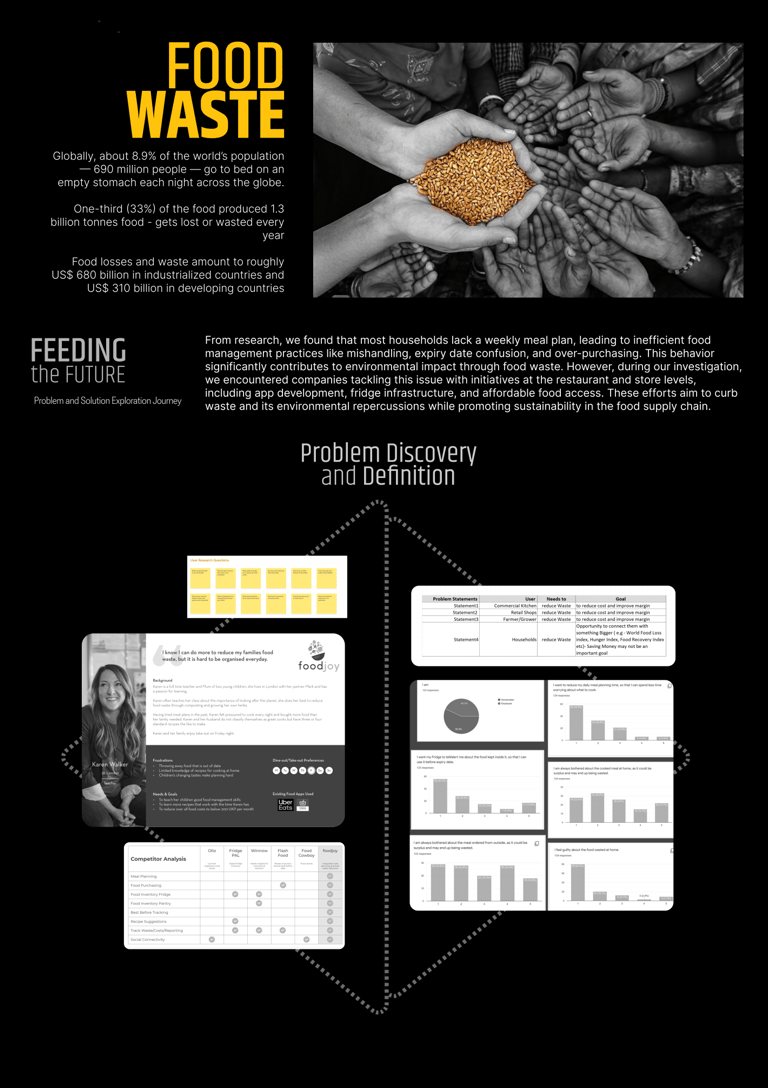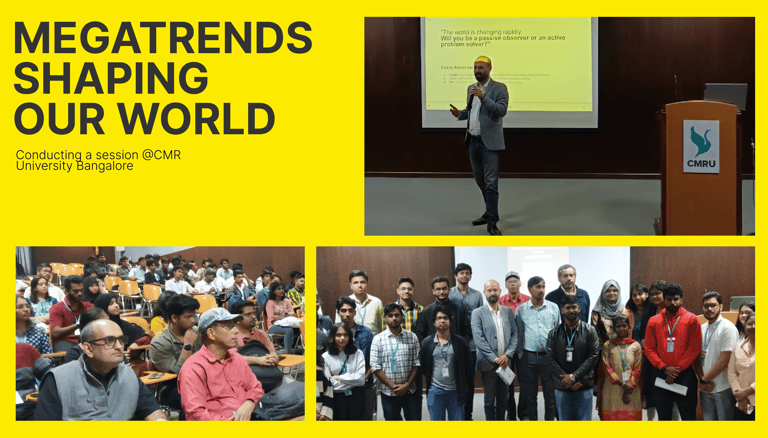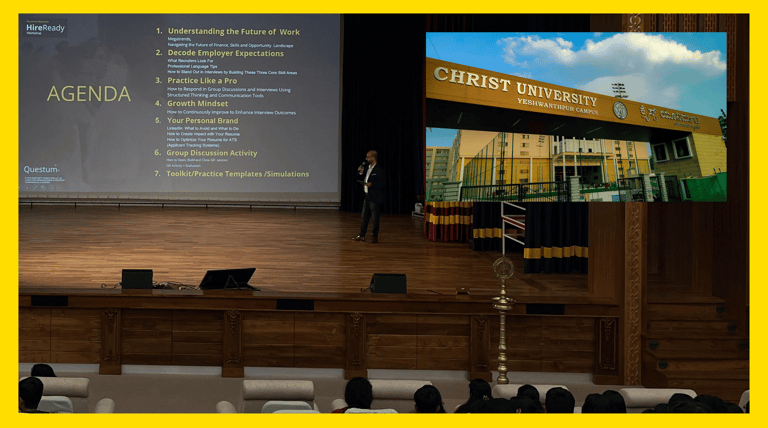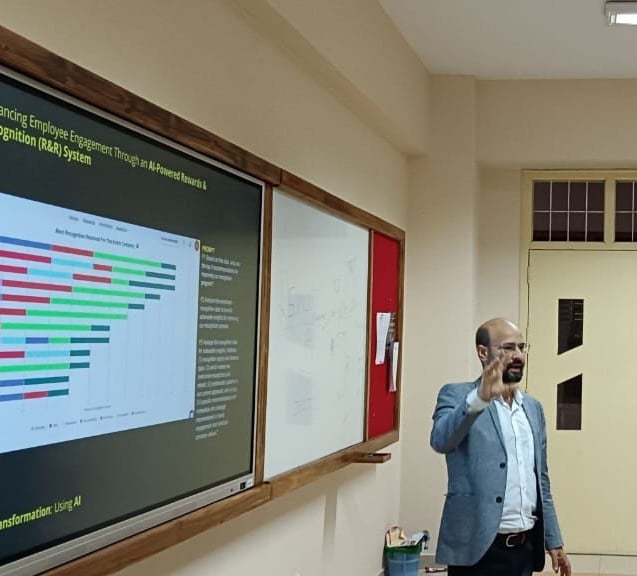
I CASE STUDY
Driving Enterprise-Wide
Gen AI Readiness Transformation
Challenge
A leading Big 4 consulting firm's Global Capability Center (GCC) aimed to build GenAI awareness, experimentation capability, and innovation mindset across 8,000+ employees in functions like Talent, Knowledge, Operations, Procurement, Creative, Branding, and Advisory.
Solution
Using the REAL (Real-world Experiential Action Learning) framework, we designed and delivered a 6-month transformation journey, including:
Awareness and discovery workshops
POV and expert-led sessions
Use case sprints and hackathons
Mentorship and prototyping labs
Leveraged Knowledge sharing and social learning platform
Teams explored real Gen AI applications and co-created new solutions embedded into daily workflows.
Business Outcomes
GenAI awareness increased from 10% to 75% across targeted teams.
Confidence in using GenAI tools rose from Level 1 (Novice) to Level 4 (Advanced User).
40+ innovation ideas generated through structured ideation workshops.
12 MVPs (Minimum Viable Products) developed — including new products and process innovations.
Achieved ~3X efficiency gains in selected core functions.
Skill levels uplifted across service lines — from Level 1 (Basic) to Level 3 (Proficient) on the organizational skills framework.
I CASE STUDY
Building Research and Problem-Framing Skills through Real-World Context
Context: Tackling Global Food Waste
Designed and facilitated a Discovery & Problem Framing Workshop using research, data, and insights to foster critical thinking, structured problem analysis, and data-driven decision-making. The workshop guided participants through a process of insight synthesis, visual data interpretation, and collaborative problem framing, resulting in greater clarity and alignment on key business challenges.
Challenge
A multidisciplinary student group from diverse academic backgrounds—including management, game design, finance, and technology—was tasked with understanding the global food waste problem. The objective was to develop applied research and problem-definition skills by exploring the real-world complexities of food waste across consumer, supply chain, and policy segments.
Approach
Using Questum’s REAL Framework (Real-world Experiential Action Learning), we facilitated a two-week intensive workshop focused on discovery and problem framing. Participants conducted primary and secondary research, built data collection tools, performed stakeholder analysis, competitive analysis, and applied systems thinking to map the problem landscape. The sessions encouraged divergent thinking, collaboration, and convergence of ideas to narrow down and define high-impact problem statements. Participants also engaged in user journey mapping, storytelling, and evaluation of existing solutions to assess impact at the socio-economic level, using qualitative and quantitative insights.
Outcomes
Developed strong foundational skills in research methodology, divergent and convergent thinking and problem definition
Exposure to real-world complexity, cross-disciplinary collaboration, and systems thinking
Successfully framed multiple problem statements across food waste domains
Enhanced ability to evaluate solutions based on user behavior, impact, and feasibility
Improved team effectiveness and co-creation capabilities in a short sprint


Workshop on Design Thinking & Megatrends – CMR University, Bangalore
Challenge
Global megatrends—climate change, automation, geopolitics, and shifting demographics—are reshaping jobs and industries. Students often struggle to connect these changes to their careers and skill development.


Outcome
Students gained clarity on how global shifts affect their futures and how to prepare for careers in tech, sustainability, and innovation. Faculty saw strong engagement and potential to align this thinking with placement and curriculum goals.
Approach
Delivered a hands-on session using Design Thinking to help students explore these megatrends and their impact. We discussed how to tackle complex problems creatively, use AI as a thought partner, and identify emerging opportunities.


I CASE STUDY
Preparing Students for Big 4 and Early-Career Consulting Roles
Workshop @ Christ University, Bangalore
Challenge
Majorly, it has been observed that students often struggle with structured thinking, problem breakdown, and personal branding during campus placements for Big 4 and consulting roles—despite strong technical skills.This gap impacts interview performance and final outcomes.
Approach & Outcome
The workshop was designed to bridge the gap between academic knowledge and real-world consulting expectations. It focused on building structured thinking, problem-solving, and personal clarity using tools like SWOT, PESTEL, and STAR/SAR. Through interactive case simulations and personal branding exercises, students developed a lateral thinking mindset and learned to communicate with clarity—equipping them to lead conversations and stand out in Big 4 and consulting interviews.


|CASE STUDY
HR/HCM Transformation through Data and AI Powered Tools/Platforms
HCM/HR in the context of and Future of Work
HR Dashboarding and Business Impact metrics
Prompt and Context Engineering key concepts
AI for strategic workforce planning and skill gap analysis
AI to build Attrition Risk prediction model
AI-powered insights for Rewards & Recognition (R&R)
AI to enable Gender Diversity Risk Prediction
AI-driven interview and feedback processes
This one-day workshop is designed and delivered for MBA-HR students at prominent universities.
